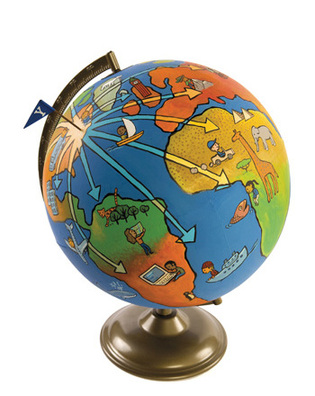 loading
loading
featuresWhat they do on their summer vacationsAs Yale seeks to go global, administrators are urging every single undergrad to spend time abroad.  Illustration by Gregory NemecView full imageIf you are a Yale undergraduate, the world is your oyster today in even more ways than it used to be. Thanks to Yale's urgent push to get all undergrads out of the United States for some portion of their college years, students can now spend the summer doing translation at the Forbidden City in Beijing, studying theater in Swaziland, writing software in Buenos Aires, performing eye care for refugees in Ghana, doing journalism in Japan, working for Mercedes-Benz in Turkey, learning wildlife management in Kenya, or working in the British Parliament. And that's an exceedingly small sample. In 2005 Yale president Richard Levin set a goal: a quarter of undergraduates would travel abroad in 2008. To that end, Yale recruited alumni around the world to host summer internships, doubled the number of Yale summer session courses taught overseas, and made it easier for students to apply for Yale course credit for study in another country. A raft of scholarships and financial aid options are available, including grants to fund the tuition contribution financial aid students are required to make from their summer earnings. And the number of undergrads going abroad has ballooned: from 18 students in the alumni-run "Bulldogs" internships in 2003 to 199 last year, and from 20 students in Yale's international summer courses in 2001 to 247 last year. Even semester study abroad, not usually popular with undergraduates, grew from 144 students in 2005-06 to 199 last year. Elite universities everywhere in the United States are globalizing their research, their faculty, and even their campuses. New York University is establishing a branch in Abu Dhabi; Georgetown and Carnegie Mellon have offshoots in Qatar. Sending students abroad is a big part of this competition. It also has a pedagogical purpose. Jane Edwards, Yale College associate dean for international affairs, points out that all Yale students today are likely to engage with people of other nationalities during their lives, even if they never travel. Research suggests, she says, that time abroad helps students understand that different cultures make different assumptions, and that "it's possible to negotiate and to create a space for oneself which allows for the constant contact of different viewpoints." She considers it Yale's educational obligation to give students "every opportunity to prepare themselves to live happily and productively in the globalized world." The rush to get students out of the country has caused a few glitches at Yale; one student told the Yale Herald that last summer she e-mailed the English-language newspaper in Ghana where she was slated to start work, only to be told that the paper had never heard of her and didn't accept foreign interns. Edwards concedes that "if you are growing programs really quickly, the first year of any program will have some wrinkles in it." But she says the Ghana program has been improved and is still online, with seven students there this year. The professional schools have embraced student globalism too. Students and faculty of the School of Music will take part in a "musicathlon" of concerts the school arranged with Beijing's Central Conservatory of Music for the Beijing Olympics. The architecture school sends students abroad for course design projects -- a peace park in Israel, a museum of fashion in Milan. The School of Management requires every student to sign up for an international business experience over winter break. Has Yale hit its target? Pretty close. Last year, 1,095 undergraduates traveled. This year the count will be 1,200, out of 5,275 total. In this issue, the Yale Alumni Magazine surveys the available numbers on student travel in all schools, summertime and term-time. We also feature stories by four undergrads about their summers last year -- not just overseas, but, as a reality check, also in the States. Creating space for oneself, after all, continues to happen at home.
The comment period has expired.
|
|